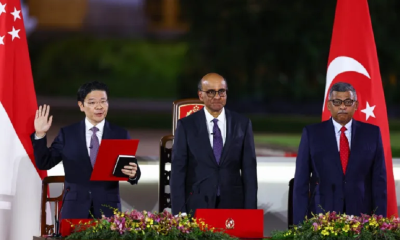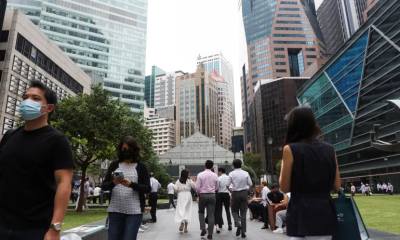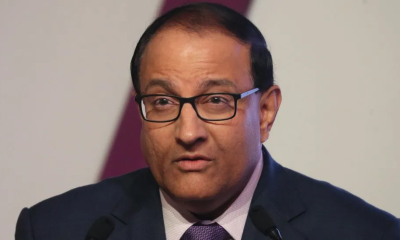Business
The $2bn dirty-money case that rocked Singapore
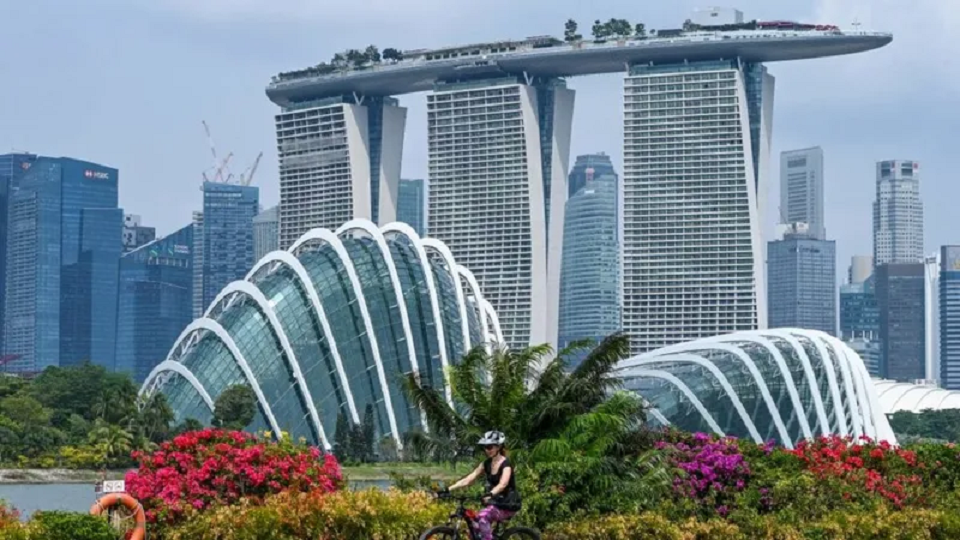
A Singaporean court has begun handing out sentences in a sensational case, which saw 10 Chinese nationals charged for laundering $2.2bn (£1.8bn) earned from criminal activities abroad.
The scandal embroiled multiple banks, property agents, precious metal traders and a top golf club. It led to extensive raids in some of the most affluent neighbourhoods, where police seized billions in cash and assets. The lurid details have gripped Singaporeans – among the seized assets were 152 properties, 62 vehicles, shelves of luxury bags and watches, hundreds of pieces of jewellery and thousands of bottles of alcohol.
Earlier this month, Su Wenqiang and Su Haijin, became the first to be jailed in the case. Su Haijin, police said, jumped off the second-floor balcony of a house trying to flee arrest. Both men will serve a little over a year in prison, after which they will be deported and barred from returning to Singapore. Eight others are still awaiting the court’s decision.
Even as it draws to a close, the case – the biggest of its kind in Singapore – has raised inevitable questions. The money that paid for their plush lives in the country, prosecutors said, came from illegal sources overseas, such as scams and online gambling.
How did these men, some of whom had multiple passports from Cambodia, Vanuatu, Cyprus and Dominica, live and bank in Singapore for years without drawing scrutiny? It has sparked a review of policies, with banks tightening rules, especially around clients who hold multiple passports.
Most important, the case has spotlighted the country’s struggle with welcoming the super wealthy, without also becoming a destination for ill-gotten gains.
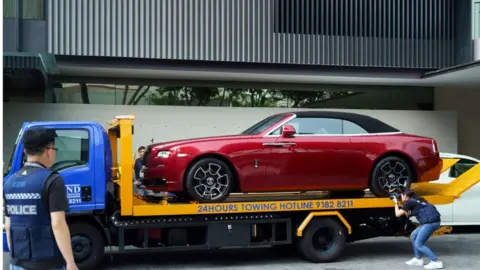
Luxury cars were among assets police seized in their raids (BBC)
Singapore, which is often referred to as the Switzerland of Asia, started wooing banks and wealth managers in the 1990s. Economic reforms in China and India had begun to pay off, and then in the 2000s, a newly-stable Indonesia saw wealth grow as well. Soon, Singapore became a haven for foreign businesses, with investor-friendly laws, tax exemptions and other incentives.
Today, the ultra-rich can fly into Singapore’s private jet terminal, live it up in luxurious quayside neighbourhoods, and speculate on the world’s first diamond trading exchange. Just outside the airport is a maximum security vault called Le-Freeport that provides tax-free storage for fine art, jewels, wine and other valuables. The $100m-facility is often dubbed Asia’s Fort Knox.
Singapore’s asset managers drew S$435bn from abroad in 2022, almost double the figure in 2017, according to the country’s market regulator. More than half of Asia’s family offices – firms which manage private wealth – are now in Singapore according to a report by consulting giant KPMG and family office consultancy Agreus.
They include those of Google co-founder Sergey Brin, British billionaire James Dyson and Chinese-Singaporean Shu Ping, boss of the world’s biggest chain of hotpot restaurants, Haidilao.
Authorities say some of the accused in the money laundering case may be linked to family offices that were given tax incentives.
“There is an inherent contradiction for a place like Singapore, which prides itself on clean and good governance but also wants to accommodate the management of massive wealth by offering advantages such as low taxes and banking secrecy,” says Chong Ja-Ian, a non-resident scholar at Carnegie China.
“The risk of also becoming a banker for individuals who earned their money through nefarious or illicit means grows.”

Singapore’s attraction for the ultra-rich comes with risks, analysts say (BBC)
For rich Chinese, Singapore is a top choice because of its reputed governance and stability, as well as its cultural links to China. And more Chinese money has been entering Singapore in recent years.
One of the 10 suspects in this case was wanted in China since 2017 for his alleged role in illegal gambling online. Prosecutors claimed that he settled in Singapore because he “wanted a safe place to hide from the Chinese authorities”.

This isn’t the first time Singapore-based banks have been implicated in a financial crime. They were found to have played a role in cross-border laundering in the 1MDB scandal, where billions were misappropriated from Malaysia’s state investment fund. Dan Tan, who was once described by Interpol as “the leader of the world’s most notorious match-fixing syndicate” also had strong business links to Singapore. He was arrested here in 2013.
The country has strict rules targeting white collar crimes and is an active member of the Financial Action Task Force, a global body which targets money laundering and financing for terror networks. Over the years, banks have invested heavily to strengthen compliance, to screen prospective customers and to urge regulators to report suspicious transactions. But none of this is foolproof.
For one, it is difficult for regulators to spot suspicious cases in a sea of high-value transactions. “It’s not just one needle in a haystack, but one needle in several haystacks,” Singapore’s second minister for home affairs, Josephine Teo, told parliament in October last year.
Singapore’s buoyant property market is a popular means to “clean” dirty money, some experts pointed out. And there are the casinos, nightclubs and luxury stores.
“Massive amounts of money pass through Singapore’s banking system every day. Criminals can exploit this feature and disguise their money laundering activities among legitimate ones,” accounting professor Kelvin Law from Singapore’s Nanyang Technological University told the BBC.
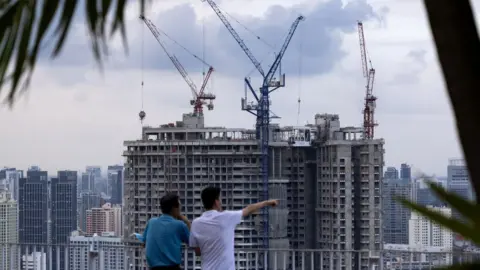
Singapore’s property market is one of the routes for dirty money, experts say (BBC)
Singapore also does not limit the amount of cash that can be carried in and out of the country, only requiring a declaration if the sum exceeds S$20,000. And that is an advantage, says Christopher Leahy, the founder of Singapore-based investigative research and risk advisory firm Blackpeak.
“If you want to move lots of money, you hide it in plain sight and Singapore is a great place for that. There is no point putting it in the Cayman Islands or the British Virgin Islands, where there is nothing to spend money on,” he said.
When asked for a response to analysts’ comments that Singapore’s advantages as a financial capital are also a draw for dirty money, authorities pointed the BBC to the law and home affairs minister interview in a local newspaper last year.
“We can’t close the window, because if we did that, then legitimate funds will also not be able to come. And legitimate business also can’t be done, or becomes very difficult to do. So we have to be sensible,” K Shanmugam said.
“When you are successful, you are a major financial centre, a lot of money comes in, some ‘flies’ will also come in,” he added, referring to an oft-repeated quote of the late Chinese leader, Deng Xiaoping.
Singapore has to decide how far it will go in accepting “money with varying shades of grey”, says Dr Chong of Carnegie China.
While increased regulation will help, he says transparency poses a bigger challenge: “Transparency goes against the very model of discretion that allows many wealth management hubs to thrive.”
Some analysts say this may well be the price Singapore is willing to pay to retain its position as a financial hub.
“The vast majority of the funds are legitimate, after all,” Mr Leahy says. “But there is an inevitable cost to being a major financial centre.”
(BBC)
Business
HNB Assurance delivers industry leading 42% revenue (GWP) growth and 28% rise in profits (PAT)

HNB Assurance PLC reported an outstanding financial performance for the year ended 31st December 2025, delivering a 42% year-on-year growth in Life Insurance Gross Written Premium (GWP), this along with the growth rate in Renewals are the highest in the industry.
Life GWP reached Rs. 19.49 Bn compared to Rs. 13.71 Bn in 2024, reflecting strong New Business generation and Renewal Collection. Net Written Premium grew even faster at 43% to Rs. 18.44 Bn, highlighting the quality and sustainability of the Company’s topline expansion.
Commenting on the results, Chairman Stuart Chapman stated, “The year under review was marked by gradual macroeconomic stabilisation, improved investor sentiment and a more predictable policy environment. Although the economy continues to recover from prior volatility, we are beginning to see renewed financial confidence among individuals and businesses. Against this backdrop, HNB Assurance has delivered strong growth in both revenue and profits, while maintaining robust capital adequacy and prudent risk management. Our improvement in top line, profitability and balance sheet strength demonstrates the resilience of our business model and our ability to navigate changing economic conditions which are reflected in an ROE which increased to 18.5% from 16.9% a year earlier.”
Profit Before Tax increased by 28% to Rs. 3.03 Bn from Rs. 2.36 Bn in the previous year, while Profit After Tax (including Life Surplus Transfer) rose by 28% to Rs. 2.12 Bn compared to Rs. 1.66 Bn in 2024. Earnings Per Share improved by 28% to Rs. 14.15 from Rs. 11.04, reinforcing the Company’s ability to consistently translate business growth into enhanced shareholder value. In line with this strong performance, the Board of Directors has proposed a first and final dividend of Rs. 5.00 per share for 2025, representing a 28% increase over the Rs. 3.90 per share declared in the previous year.
Executive Director and Chief Executive Officer Lasitha Wimalaratne highlighted the consistency of the Company’s upward trajectory. “Our 2025 performance reflects a sustained pattern of high growth and disciplined execution over the past four years. During this period, we have consistently strengthened our distribution reach, enhanced advisor productivity, invested in digital enablement and sharpened our customer centric value proposition. Each year we have built on the previous year’s gains, and the 42% growth in Life GWP in 2025 is the strongest affirmation yet of that strategy. Importantly, we have achieved this while maintaining underwriting discipline, expanding our Life Fund and delivering a 28% increase in PAT.”
The strength of the Company’s balance sheet continued to improve during the year. Total Assets grew by 28% to Rs. 68.44 Bn from Rs. 53.40 Bn, while financial investments increased by 29% to Rs. 62.49 Bn from Rs. 48.49 Bn in 2024, reflecting disciplined asset accumulation and prudent investment management. Total Equity rose to Rs. 12.19 Bn from Rs. 10.81 Bn, supported by Retained Earnings which grew by 18% to Rs. 10.23 Bn.
The Life Insurance Fund recorded a significant expansion of 27%, increasing to Rs. 48.87 Bn from Rs. 38.34 Bn in the previous year. During the year, the Company paid Rs. 4.40 Bn in Net Insurance Benefits and Claims, honouring its commitments to policyholders and their families while further strengthening long term reserves. Investment Income remained a key contributor to performance, with interest and dividend income rising by 10% to Rs. 7.49 Bn.
The Market Capitalisation as at the end of the year stood at Rs. 17.21 Bn up 43% from a year ago when it was Rs. 12.02 Bn, while trading for year ended at Rs. 114.75 per share increasing by 43% from Rs. 81.10 a year ago.
Business
Phoenix Ogilvy Dominates Sri Lanka’s Creative Rankings
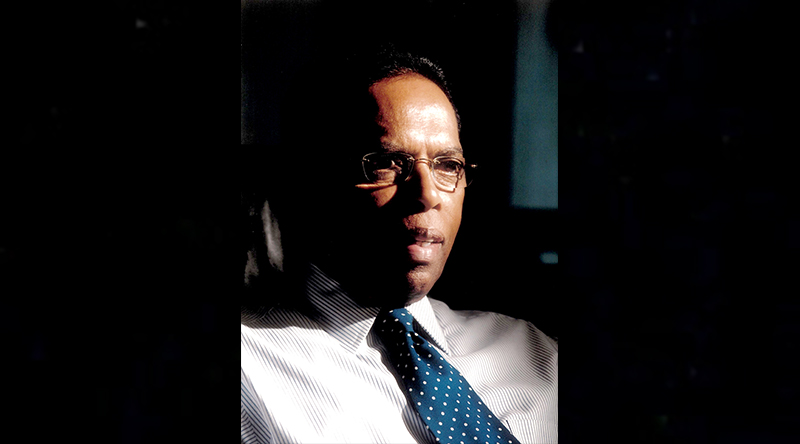
Standout year with international award show wins at LIA, One Asia, Clio, AdFest, Spikes Asia & The Work
Phoenix Ogilvy has been named 2025 Sri Lanka Agency of the Year after topping The Campaign Brief Asia’s Creative Rankings as the most internationally awarded agency in the country, an agency news release said..
The agency’s ranking also marks Sri Lanka’s return to the list in 2025, following the country’s absence from it the previous year.
The Campaign Brief Asia Creative Rankings annually evaluate the top 100 most awarded creative agencies in Asia, based on their achievements across leading international award shows.
The rankings are widely regarded as one of Asia’s most credible measures of creative excellence. Agencies accumulate points purely from award wins across major international creative shows, making it one of the longest-running and most respected benchmarks of creative performance in the region.
Phoenix Ogilvy secured the top spot in the national table, amassing an impressive 295 Creative Ranking points after standout wins across six major international creative award shows, including London International Awards (LIA), One Asia Awards, Clio Awards, AdFest, Spikes Asia, and Campaign Brief’s The Work.
Being ranked at the top not only signals national creative leadership for Phoenix Ogilvy but also exhibits the agency’s talent strength. In a testament to this creative calibre, the agency’s talent dominated the Campaign Brief Asia’s Individual Creative Rankings in Sri Lanka.
Leading this list is Nadeera Warawita with 250 Creative Ranking points, followed by Sakuna Ranasinghe at No. 2 with 220 points, and Samitha Kaushalya at No. 3 with 150 points. Meanwhile ranked jointly at No. 4, are Dilshi Aberaja, Dilshard Ahamed, Harsha Kumara, Kasun Wadumestri, Keshan Silva, and Suresh Kumar. At no. 10 is Dilshi Thathsarani.
Speaking on these achievements, Irvin Weerackody, Chairman of the Ogilvy Group Sri Lanka, said, “Creativity has always been our lifeblood, and it is encouraging to see that commitment recognised on the world stage. The real test of an agency is not the trophies, but the courage to create with integrity, especially today. These achievements not only reflect the capability of our talent, but importantly their discipline, their cultural instinct and their refusal to take the easy way out. I am proud of our teams, who continue to push themselves year after year to raise the bar and uphold the standards we believe in.”
For five decades, Phoenix Ogilvy has been a defining pillar of the country’s marketing landscape and an influential creative powerhouse. From its earliest days, the agency has challenged convention and advocated brave thinking, producing work that commands attention, both locally and internationally.
Renowned as a formidable training ground for Sri Lankan advertising talent, the agency has also played a pivotal role in shaping generations of trailblazing creatives, strategic thinkers, and industry leaders who continue to leave their mark across the region and beyond.
Strengthened by the global Ogilvy network, the agency enjoys a rare blend of global creative rigour and deep local intelligence. Over the years, it has diversified across multiple disciplines and today stands as a talent hub for 290 industry specialists spanning creative, strategy, digital, media, public relations and integrated communications in Sri Lanka.
At its core, the agency remains true to the principles it was built on: that great ideas come from disciplined minds, uncompromising craft, and the refusal to settle for the ordinary.
Business
Oak Ray Chef Marks a Culinary Milestone with 118 Unique Creations

In the intricate world of pastry and bakery arts, R.S. Weerakoon has emerged as a visionary creator, known for his extraordinary ability to transform any concept into a stunning cake masterpiece. Currently serving as the Head Chef (Pastry & Bakery) at the Oak Ray Group in Kandy, Weerakoon’s journey is a blend of local talent and international expertise.
An alumnus of Udispattuwa Maha Vidyalaya, Weerakoon holds an NVQ Level 04 qualification from NAITA and is a distinguished member of the Chefs’ Guild of Sri Lanka. With over 14 years of experience in the industry, including valuable tenures in Kuwait and Oman, he has successfully integrated Middle Eastern culinary trends with local flavors.
One of his most significant contributions to the industry is the introduction of 118 unique products to the Oak Ray Group. Remarkably, all these creations are made without the use of any artificial food colorings, prioritizing the health and well-being of consumers.
Speaking about this talented professional, the Chairman of the Oak Ray Group, Mr. Sujeewa Palliyaguruge, stated that his vision is to provide a creative platform for such skilled young individuals.
“Our goal is to allow talented creators like Weerakoon the freedom to innovate and bring their unique visions to life, which ultimately benefits the entire culinary industry in Sri Lanka,” he said.
Weerakoon’s dedication to natural ingredients and his mastery of cake architecture continue to set new benchmarks for the next generation of chefs in the hill capital.
- R.S. Weerakoon
By S.K. Samaranayake
Pix by Razik Jabbar
-

 Features6 days ago
Features6 days agoLOVEABLE BUT LETHAL: When four-legged stars remind us of a silent killer
-

 Business6 days ago
Business6 days agoBathiya & Santhush make a strategic bet on Colombo
-

 Business6 days ago
Business6 days agoSeeing is believing – the silent scale behind SriLankan’s ground operation
-

 Latest News7 days ago
Latest News7 days agoIndia, South Africa meet in the final before the final
-

 Features6 days ago
Features6 days agoProtection of Occupants Bill: Good, Bad and Ugly
-

 News6 days ago
News6 days agoPrime Minister Attends the 40th Anniversary of the Sri Lanka Nippon Educational and Cultural Centre
-

 Business6 days ago
Business6 days agoHuawei unveils Top 10 Smart PV & ESS Trends for 2026
-

 News6 days ago
News6 days agoCoal ash surge at N’cholai power plant raises fresh environmental concerns




